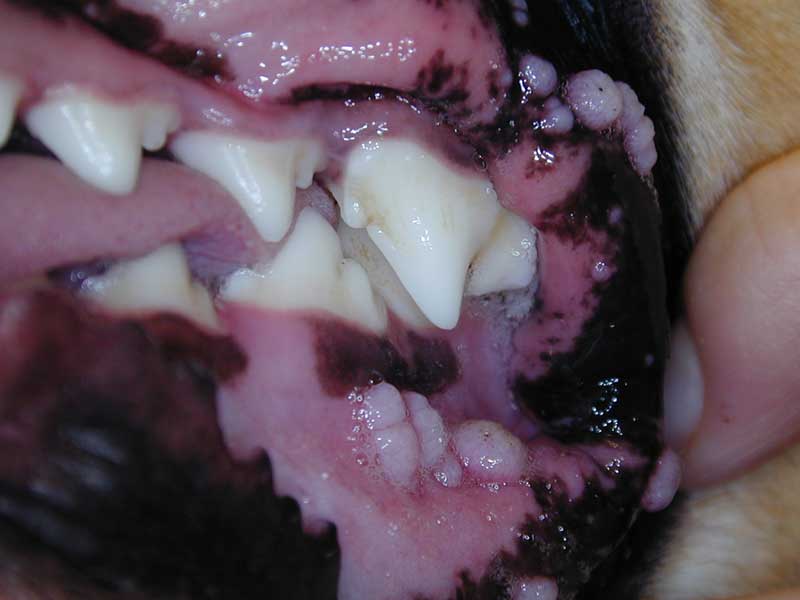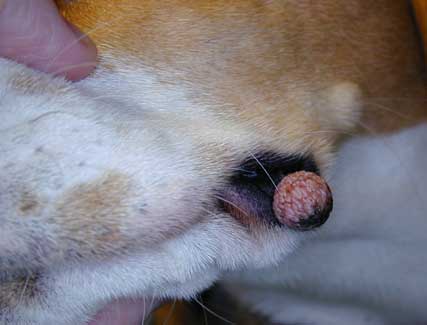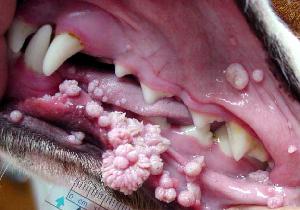Oral Papillomas
 Oral papillomas are "warts" that occur in the mouth. A dog may have a solitary papilloma or may have multiple warts in the mouth (hundreds to thousands). The papillomas can show up on the lips, tongue, roof of the mouth, or inside the cheeks. Oral papillomas are "warts" that occur in the mouth. A dog may have a solitary papilloma or may have multiple warts in the mouth (hundreds to thousands). The papillomas can show up on the lips, tongue, roof of the mouth, or inside the cheeks.
Oral papillomas are caused by a virus, just like human skin warts. Because they are viral, they are transmissible from dog to dog. The virus is present in the papillomas, and the infection is spread by direct contact with the papilloma in an infected dog's mouth. The incubation period is 1 to 2 months, so if your dog has oral papillomas he or she got the infection quite some time ago.
Oral papillomas occur relatively commonly in dogs, and usually affect dogs in puppyhood and as young adults. This virus is NOT contagious to people or to any other animals except dogs. If you get a wart, blame your human friends!
 Treatment of the warts usually consists of "benign neglect". That is, we know that the papillomas are there, and we keep an eye on them, but unless they are causing problems for the dog we "neglect" to treat them. Most papillomas will regress on their own over 1 to 5 months. Over this time period the dog's immune system matures and the dog is able to mount a proper immune response to the virus and get rid of the infection. Usually the papillomas just fall off once the immune system "rejects" them, and the dog remains immune to further infections. Treatment of the warts usually consists of "benign neglect". That is, we know that the papillomas are there, and we keep an eye on them, but unless they are causing problems for the dog we "neglect" to treat them. Most papillomas will regress on their own over 1 to 5 months. Over this time period the dog's immune system matures and the dog is able to mount a proper immune response to the virus and get rid of the infection. Usually the papillomas just fall off once the immune system "rejects" them, and the dog remains immune to further infections.
If there are a large number of papillomas, or there are a few very large ones, or they are located in a place that causes the dog a lot of distress or discomfort (very rare), surgery may be indicated. A general anesthetic is required and the lesions are removed. Some veterinarians recommend crushing a few of the papillomas while the pet is under anesthesia and leaving them in place. This releases virus from the papilloma and speeds up the response of the immune system.
Interferon-alpha treatments are another option for dogs with severe oral papillomas. This treatment is quite expensive (about $50 per treatment just for the drug, given three times a week until two weeks after all lesions have resolved). Interferon helps to "stimulate" the normal immune response for faster regression of the lesions. Obviously this is reserved for severe cases where the expense of treatment is justified.
 Obviously dogs with this viral infection should be kept away from other dogs to prevent spread. As a rule of thumb you should avoid dog daycare, shows, agility trials, play at the dog park, and any other times when the dogs are "swapping spit" in play or by accident for 2 months beyond the regression (or surgical removal) of the papillomas. In other words, when you see the last papilloma disappear, wait another 2 months before engaging in doggie social activities again. Yes, this means that your dog may be socially isolated for up to 6 months. Why so long? Because the incubation period is up to 2 months. If 2 months goes by without a new papilloma appearing, you can assume that the infection is gone for good. Obviously dogs with this viral infection should be kept away from other dogs to prevent spread. As a rule of thumb you should avoid dog daycare, shows, agility trials, play at the dog park, and any other times when the dogs are "swapping spit" in play or by accident for 2 months beyond the regression (or surgical removal) of the papillomas. In other words, when you see the last papilloma disappear, wait another 2 months before engaging in doggie social activities again. Yes, this means that your dog may be socially isolated for up to 6 months. Why so long? Because the incubation period is up to 2 months. If 2 months goes by without a new papilloma appearing, you can assume that the infection is gone for good.
|